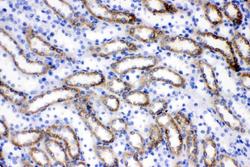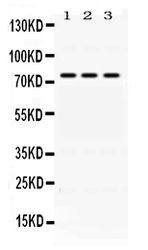PB10025
antibody from Boster Biological Technology
Targeting: ACSL1
ACS1, FACL1, FACL2, LACS, LACS1, LACS2
Antibody data
- Antibody Data
- Antigen structure
- References [1]
- Comments [0]
- Validations
- Immunohistochemistry [1]
Submit
Validation data
Reference
Comment
Report error
- Product number
- PB10025 - Provider product page

- Provider
- Boster Biological Technology
- Product name
- Anti-ACSL1 Antibody Picoband™
- Antibody type
- Polyclonal
- Description
- Polyclonal antibody for ACSL1 detection. Host: Rabbit.Size: 100μg/vial. Tested applications: WB, IHC-P, ICC/IF, FCM. Reactive species: Human;Mouse;Rat. ACSL1 information: Molecular Weight: 77943 MW; Subcellular Localization: Mitochondrion outer membrane ; Single-pass type III membrane protein . Peroxisome membrane ; Single-pass type III membrane protein . Microsome membrane ; Single-pass type III membrane protein . Endoplasmic reticulum membrane ; Single-pass type III membrane protein ; Tissue Specificity: Highly expressed in liver, heart, skeletal muscle, kidney and erythroid cells, and to a lesser extent in brain, lung, placenta and pancreas.
- Reactivity
- Human, Mouse, Rat
- Host
- Rabbit
- Vial size
- 100μg/vial
- Concentration
- Add 0.2ml of distilled water will yield a concentration of 500ug/ml.
- Storage
- At -20°C for one year. After reconstitution, at 4°C for one month. It can also be aliquoted and stored frozen at -20°C for a longer time. Avoid repeated freezing and thawing.
- Handling
- Add 0.2ml of distilled water will yield a concentration of 500ug/ml.
Submitted references Transcriptomics and molecular docking reveal the potential mechanism of lycorine against pancreatic cancer.
Zhou X, Guo Z, Liu S, Chen Z, Wang Y, Yang R, Li X, Ma K
Phytomedicine : international journal of phytotherapy and phytopharmacology 2024 Jan;122:155128
Phytomedicine : international journal of phytotherapy and phytopharmacology 2024 Jan;122:155128
No comments: Submit comment
Supportive validation
- Submitted by
- Boster Biological Technology (provider)
- Main image

- Experimental details
- ACSL1 was detected in paraffin-embedded sections of rat kidney tissues using rabbit anti- ACSL1 Antigen Affinity purified polyclonal antibody (Catalog # PB10025) at 1 μg/mL. The immunohistochemical section was developed using SABC method (Catalog # SA1022).
- Additional image

 Explore
Explore Validate
Validate Learn
Learn Western blot
Western blot Immunohistochemistry
Immunohistochemistry